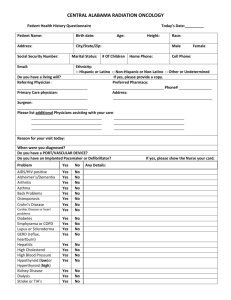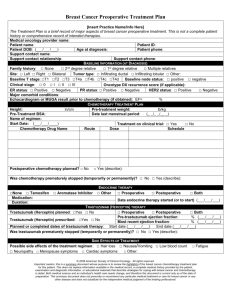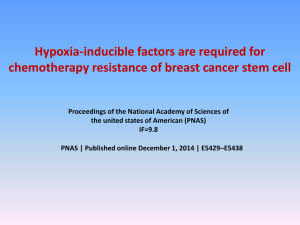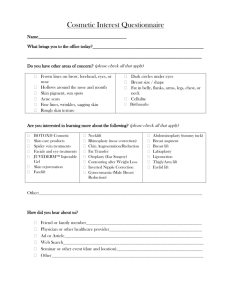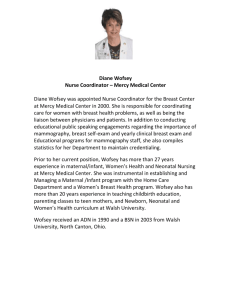Recommendations For Use Of Chemotherapy For The Treatment Of
advertisement
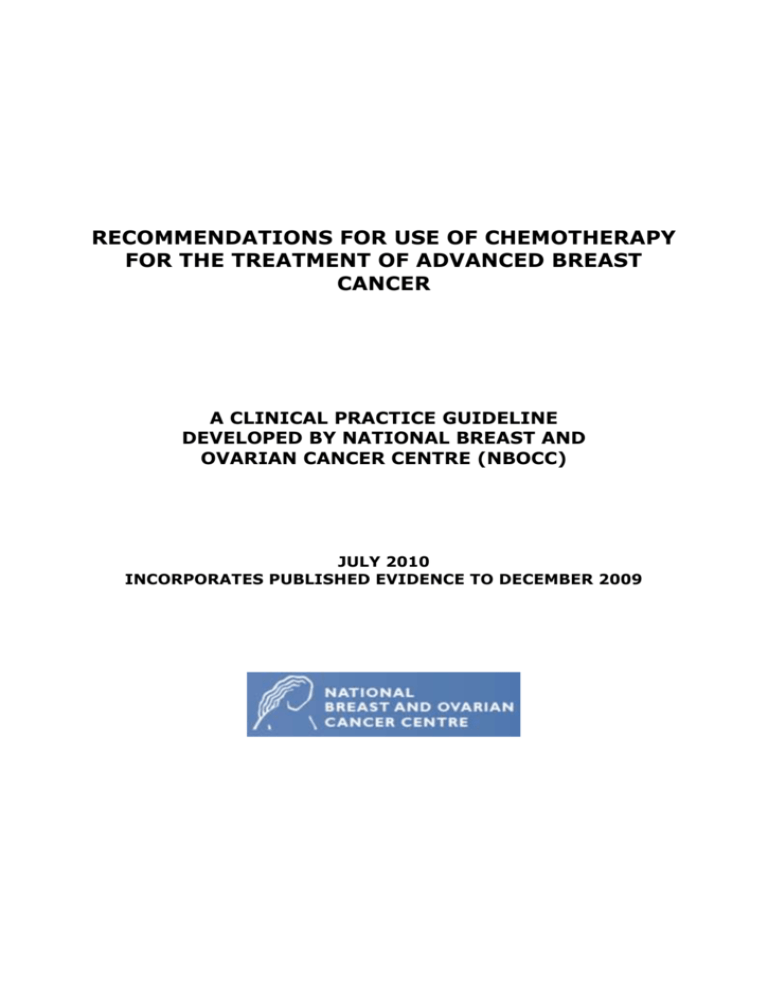
RECOMMENDATIONS FOR USE OF CHEMOTHERAPY FOR THE TREATMENT OF ADVANCED BREAST CANCER A CLINICAL PRACTICE GUIDELINE DEVELOPED BY NATIONAL BREAST AND OVARIAN CANCER CENTRE (NBOCC) JULY 2010 INCORPORATES PUBLISHED EVIDENCE TO DECEMBER 2009 This document supplements guideline recommendation 25 on the use of chemotherapy for the management of advanced breast cancer contained in the National Breast Cancer Centre (NBCC)* Clinical practice guidelines for the management of advanced breast cancer, 2nd edition, 2001 (pages 9-I0).1 Purpose This guideline includes statements and recommendations based on available, high-level evidence about the use of chemotherapy for the treatment of advanced breast cancer. The guideline provides health professionals with information designed to help them make management recommendations for improved patient outcomes. NBOCC also develops information specifically for consumers about the diagnosis and treatment of advanced (secondary) breast cancer. Endorsed by: Background Advanced breast cancer includes locally advanced and metastatic breast cancer. 1 The goals of treatment in advanced breast cancer are to maximise length of life (overall survival) and quality of life. There are a number of important components of clinical care for women with advanced breast cancer. These include using anti-cancer treatments to control disease-related symptoms and slow progression of disease, minimising treatment-related toxicity, and reducing the intrusion of the disease and treatment on a woman's life. Improvements in cancer treatment mean that some women will live for many years after a diagnosis of advanced breast cancer. The standard systemic treatments for women with advanced breast cancer include chemotherapy, targeted therapy and endocrine therapy. † Chemotherapy drugs used to treat advanced breast cancer include: alkylating agents, e.g. cyclophosphamide anthracyclines, e.g. doxorubicin, epirubicin antimetabolites, e.g. capecitabine, 5-fluorouracil, gemcitabine, methotrexate taxanes, e.g. docetaxel, paclitaxel, nab-paclitaxel vinorelbine. Targeted therapies used to treat advanced breast cancer include: bevacizumab, lapatinib and trastuzumab. ‡ The selection of specific chemotherapy drugs, combinations, doses, schedules and durations is based on: the pathological characteristics of the tumour, especially whether it expresses higher-than-normal levels of the HER2 protein (HER2-positive tumours) the clinical characteristics of the tumour, especially its extent and growth rate the woman's past exposure and response to chemotherapy co-morbidities quality of life considerations including unwanted effects of chemotherapy the woman's preferences the woman's age practical considerations. For a summary of current evidence for endocrine therapy in advanced breast cancer, refer to NBOCC's Recommendations for use of endocrine therapy for the treatment of hormone receptor-positive advanced breast cancer.2 † For a summary of current evidence for trastuzumab in advanced breast cancer, refer to NBCC's* Recommendations for use of trastuzumab (Herceptin®) for the treatment of HER2-positive breast cancer.3 ‡ 1 Summary of Evidence The statements and recommendations about the use of chemotherapy for women with advanced breast cancer are based on: a review of 63 randomised trials of chemotherapy in metastatic breast cancer published between 2000 and 20074 a Cochrane review investigating single-agent versus combination chemotherapy for metastatic breast cancer5 a review of randomised trials comparing taxane-containing regimens for metastatic breast cancer6 a review of randomised trials of adding targeted agents to a chemotherapy regimen for metastatic breast cancer.7 Additional relevant articles and two significant abstracts, published after the completion of these reviews up until December 2009, have also been considered. No trials have directly compared chemotherapy with best supportive care in women with advanced breast cancer. Strong indirect evidence that chemotherapy improves survival and quality of life comes from older randomised trials of different doses and durations of chemotherapy,1 and more recent trials comparing various chemotherapy regimens. Chemotherapy improves overall survival and quality of life by reducing the tumour size, growth rate or both, in women with responsive tumours. However, chemotherapy can also cause adverse effects.1 Differences between the effect of various established chemotherapy drugs and regimens on overall survival are modest in women with advanced breast cancer. Treatment decisions should be based on consideration of the woman's specific circumstances, attitudes and preferences, as well as pertinent high-quality evidence from randomised trials. *In February 2008, National Breast Cancer Centre incorporating the Ovarian Cancer Program (NBCC) changed its name to National Breast and Ovarian Cancer Centre (NBOCC) 2 Recommendations Please see Appendix 1 (pages 11-14) for statements of evidence on which the following recommendations are based. Recommendations to individuals should be based on their circumstances, the absolute benefits and harms of treatment, and their personal preferences. These factors should be discussed with the woman.8 Women receiving chemotherapy should be reviewed regularly and monitored for adverse events. In women with advanced breast cancer: Recommendations Level of evidence9 Reference There are several specific chemotherapy drugs and/or and combinations with similar efficacy in any given situation In general: I Cochrane5 II Sledge10 III Soto11 I Cochrane5 Recommendations Level of evidence9 Reference Tumour response should be assessed every 6-12 weeks 2-3 cycles) during chemotherapy IV — If disease control (stable disease or better) is confirmed and toxicity is tolerable, then chemotherapy should be continued for 18-24 weeks (6-8 cycles) I Gennari12 Extending chemotherapy beyond the standard duration (1824 weeks; 6-8 cycles) is an option if toxicity is minimal and the goal is to delay progression I Gennari12 combination chemotherapy should be considered for women with little or no previous exposure to chemotherapy, widespread or rapidly progressing disease, and few or no co-morbidities sequential single-agent chemotherapy should be considered for women with limited or indolent disease, previous exposure to chemotherapy, or significant co-morbidities In women with visceral hormone receptor-positive disease that is extensive or rapidly progressing, initial chemotherapy should be considered in preference to initial endocrine therapy Duration of chemotherapy Extending chemotherapy beyond the standard duration has little or no effect on overall survival 3 Taxanes Recommendations Level of evidence9 Reference Single-agent taxanes are an alternative to anthracyclines for first-line treatment for women with advanced breast cancer I Piccart- Combination chemotherapy that includes a taxane should be considered for women who have rapidly progressing or extensive visceral disease and limited previous exposure to chemotherapy II Sledge10 Paclitaxel II CALGB 984014 The recommended dose and schedule for weekly paclitaxel is 80 mg/m2, with a one week break every 4-8 weeks according to toxicity and the woman's preferences II CALGB 934215 II Harvey16 II Gradishar17 Gebhart13 The recommended dose for 3-weekly paclitaxel is 175 mg/m2 given over 3 hours Docetaxel The recommended dose and schedule for 3-weekly docetaxel is 75-100 mg/m2 Albumin-bound paclitaxel Nanoparticle albumin-bound paclitaxel is an alternative to 3weekly paclitaxel, but has not been compared with standard paclitaxel given weeklya Guan18 Antimetabolites Recommendations Level of evidence9 Reference Capecitabine as first-line chemotherapy II Stockler20 Recommendations Level of evidence9 Reference Capecitabine and docetaxel II O'Shaughnessy2 Single-agent capecitabine is an option for women for whom more intensive chemotherapy is not appropriate Antimetabolites and taxanes 1 The combination of capecitabine and docetaxel is an option for women with rapidly progressing or extensive visceral disease, good performance status and limited exposure to previous chemotherapy Gemcitabine and paclitaxel II Albain22 The combination of gemcitabine and paclitaxel is an option for women with rapidly progressing or extensive visceral disease, good performance status and limited exposure to previous chemotherapy13 4 Targeted therapies Recommendations Level of evidence9 Reference Trastuzumab — — II ECOG E210023 Recommendations for women with HER2-positive advanced breast cancer are detailed in NBCC's guideline Recommendations for use of trastuzumab (Herceptin®) for the treatment of HER2-positive breast cancer3 Bevacizumab with first- or second-line chemotherapy for metastatic breast cancer AVADO24 The routine addition of bevacizumab to chemotherapy is not recommended because the benefits do not outweigh the additional adverse effectsc Lapatinib after progression of disease on trastuzumab Miller25 II Geyer26, 27 The combination of lapatinib and capecitabine is a good option for women with disease that has progressed after chemotherapy with an anthracycline, a taxane and trastuzumabd A recent trial showed that first-line treatment with nab-paclitaxel significantly improved progression-free survival for women with metastatic breast cancer compared with 3-weekly docetaxel.19 a Preliminary results from a recent trial indicate that the addition of a PARP inhibitor to gemcitabine/ carboplatin compared with gemcitabine/carboplatin alone shows potential benefit for progression-free survival and overall survival for women with triple negative metastatic breast cancer.28 b A recent trial showed that the addition of bevacizumab to first-line treatment with capecitabine/taxane/ anthracycline significantly improved progression-free survival for women with HER2-negative metastatic breast cancer.29 c A recent trial showed that the combination of lapatinib and trastuzumab significantly improved progressionfree survival compared with lapatinib alone for women with HER2-positive metastatic breast cancer.30 d 5 Summary of Trial Results The most commonly measured efficacy endpoints in chemotherapy trials are tumour response rate, progression-free survival and overall survival. Of these, the most critical is overall survival. The evidence that chemotherapy improves overall survival in advanced breast cancer is indirect but compelling. However, significant benefits seen in overall survival for one chemotherapy regimen over another are relatively small in clinical trials. Superiority for these endpoints of one regimen over another will also influence treatment decisions, particularly where disease is rapidly progressing and a quick response is necessary. Both quality of life and treatment toxicity are important factors to be considered. While toxicity is generally well-recorded in clinical trials, quality of life is less frequently measured and the reported analyses of quality of life data are often superficial. Overall survival A review4 of 63 trials, including over 21,000 women, identified eight trials that reported a statistically significant overall survival benefit ranging from 3-7 months (see Table 1). Table 1. Chemotherapy trials in advanced breast cancer with an overall survival benefit (p<0.05) Trial Arm A Arm B Number of patients(n) OS Arm A (months) OS Arm B (months) p-value Feher 20 0531 Epirubicin Gemcitabine 410 19.1 11.8 0.0004 O'Shaughnes sy 200221 Docetaxel/ capecitabine Docetaxel 511 14.5 11.5 0.01 Jassem 200132 Doxorubicin/ paclitaxel FAC 267 23.3 18.3 0.01 Albain 200822 Paclitaxel/ gemcitabine Paclitaxel 529 18.5 15.8 0.02 Bontenbal 200533 Docetaxel/ doxorubicin FAC 216 22.6 16.2 0.02 Stockler 200720 Intermittent or continuous capecitabine CMF 325 22.0 18.0 0.02 Jones 200534 Docetaxel Paclitaxel 449 15.4 12.7 0.03 Icli 200535 Oral etoposide/ cisplatin Paclitaxel 201 14.0 9.5 0.04 Notes: OS = overall survival; FAC = 5-fluorouracil/doxorubicin/cyclophosphamide; CMF = cyclophosphamide/ methotrexate/5-fluorouracil A Cochrane meta-analysis5 found that combination chemotherapy improved tumour response rates, time to progression and overall survival, but was associated with higher rates of toxicity, compared with single-agent chemotherapy. However, very few such trials specifically compared a combination regimen with the sequential use of the component agents. In two trials10, 11 that did so, differences in time to progression (after 6 both drugs) and overall survival were not seen, suggesting that the sequential use of single agents is safe and effective in the absence of rapidly progressive disease. Older trials36, 37 have shown that lower-than-standard doses or very short durations of chemotherapy may be associated with reduced overall survival compared to standard doses. A Cochrane review38 showed that very high dose chemotherapy did not improve overall survival and a 2008 meta-analysis12 found that extending chemotherapy beyond the standard duration (18-24 weeks) had little effect on overall survival. Thus optimal overall survival is achieved when standard doses and durations of conventional drug regimens are used. Progression-free survival and response rate In trials published between 2000 and 2007, 22 trials4 reported statistically significant differences in progression-free survival, and 19 trials4 reported significant differences in response rate. Considered together, these trials4 showed improved progression-free survival or response rates for combinations compared with single agents, anthracyclines compared with non-anthracycline regimens, and taxanes compared with non-taxane regimens. Targeted therapies How best to incorporate targeted therapies into chemotherapy regimens is the subject of ongoing trials. Trials25-27, 39 testing the addition of lapatinib or bevacizumab have demonstrated some clinical benefits, but not differences in overall survival. A trial 26, 27 in women with HER2-positive breast cancer that had progressed after trastuzumab, showed that the addition of lapatinib to capecitabine improved response rate and time to progression, but not overall survival, compared with capecitabine alone. Quality of life Only a third of the 63 trials4 identified in the 2000-2007 review mentioned formal quality of life measurements in the abstract. While toxicity is sometimes used as a surrogate for quality of life, two important older trials36, 37 showed that toxicity and quality of life are not always closely linked. These trials36, 37 showed that strategies to limit toxicity (by lowering either the dose or duration of chemotherapy) led to decreased quality of life. Table 2. Common chemotherapy drugs and their side effects Please see Appendix 1 (pages 11-14) for further evidence on adverse effects of chemotherapy drugs. Class/agent Characteristic side effects of common chemotherapy drugs Alkylating agents1 Bladder irritation, fatigue, hair loss, lowered blood counts, nausea/vomiting Cyclophosphamide Anthracyclines1 Cardiac toxicity, fatigue, lowered blood counts, mouth ulcers, nausea/vomiting Doxorubicin, epirubicin Antimetabolites1 Diarrhoea, fatigue, hand-foot syndrome, nausea, stomatitis Capecitabine 7 Class/agent Characteristic side effects of common chemotherapy drugs Taxanes1 Allergic reactions (paclitaxel), fatigue, hair loss, lowered blood counts, muscle aches, neurological damage Docetaxel, paclitaxel Vinorelbine1 Fatigue, injection site pain, hair loss (moderate), lowered blood counts, neuropathy Targeted therapies Cerebrovascular ischemia, fatigue, headache, hypertension, infection, sensory neuropathy, proteinuria Bevacizumab 39 Lapatinib26 Trastuzumab3 Diarrhoea, dyspepsia, fatigue, hand-foot syndrome, nausea/ vomiting, rash Anaemia, cardiac dysfunction, infection, leukopenia, neutropenia 8 Strengths and Weaknesses of the Evidence The main strength of the evidence reviewed is the long history of well-conducted randomised trials testing different chemotherapy strategies in advanced breast cancer. A major limitation of the evidence is the paucity of data about the effects of different treatments on quality of life and symptom control. Unanswered Questions Important unanswered questions about the use of chemotherapy in advanced breast cancer are outlined below: What is the optimal duration of chemotherapy, especially when combined with targeted therapy? How would clinical outcomes improve by individualising chemotherapy according to laboratory measures of tumour sensitivity? What is the significance of changes in tumour markers and genetic profiling for use of chemotherapy? What is the optimal duration of targeted therapy when combined with chemotherapy? What evidence is available from clinical trials for treatment of metastatic breast cancer beyond the first-line setting? What are the quality of life and symptom control issues associated with the use of chemotherapy? How could chemotherapy be used in association with endocrine therapies and supportive therapies? When disease progresses, when should targeted therapies be discontinued? 9 Appendix 1: Statements of Evidence The following statements of evidence support the NBOCC recommendations for use of chemotherapy for the treatment of advanced breast cancer (pages 4-6). In women with advanced breast cancer: Statements Level of evidence9 Reference Combination chemotherapy increases response rates, time to progression, toxicity and overall survival, compared with single-agent chemotherapy, not including sequential use of the same drugs I Cochrane5 Combination chemotherapy increases response rates and toxicity, but not time to progression or overall survival, compared with sequential use of the same drugs as single agents II Sledge10 In women with hormone receptor-positive disease: I Cochrane5 Statements Level of evidence9 Reference Higher-than-standard doses of chemotherapy increase tumour response and toxicity, but not time to progression or overall survival, compared with standard doses I Cochrane5 Lower-than-standard doses of chemotherapy do not improve quality of life and survival, compared with standard doses II Tannock37 Statements Level of evidence9 Reference Extending chemotherapy beyond the standard duration (18-24 weeks; 6-8 cycles) delays progression but has limited effect on overall survival I Gennari12 Shorter-than-standard durations (<18-24 weeks) of chemotherapy result in reduced overall survival and quality of life II Coates36 initial chemotherapy achieves similar overall survival to initial endocrine therapy, except in those with visceral disease that is extensive or rapidly progressing, where initial chemotherapy shows improved survival endocrine therapy has fewer adverse effects than chemotherapy Soto11 Dose Duration 10 Taxanes Statements Level of evidence9 Reference Single-agent taxanes give similar response rates and overall survival, but shorter time to progression compared with anthracyclines I Piccart- Gebhart13 II Sledge10 II CALGB 984014 II CALGB 934215 II Harvey16 II Jones34 Taxane-based combination chemotherapy increases response rates and time to progression, but not overall survival, compared with anthracyclines Paclitaxel When compared with 3-weekly paclitaxel, use of weekly paclitaxel: increases time to progression and overall survival causes less myelosuppression, but more neuropathy requires more clinic visits For 3-weekly paclitaxel: increasing the dose beyond 175mg/m increases toxicity, but not response rate, survival or quality of life 2 Docetaxel For 3-weekly docetaxel: increasing the dose from 75 mg/m2 to 100 mg/m2 increases response rates and toxicity, but not time to progression or overall survival reducing the dose from 75 mg/m2 to 60 mg/m2 decreases toxicity Docetaxel versus paclitaxel 3-weekly docetaxel and weekly paclitaxel both increase response rates, time to progression and overall survival, when compared with 3-weekly paclitaxel CALGB 984014 No randomised trials in advanced breast cancer have directly compared 3-weekly docetaxel with weekly paclitaxel When compared with paclitaxel, docetaxel causes: II Jones34 Albumin-bound paclitaxel II Gradishar17 When compared with standard 3-weekly paclitaxel, nanoparticle albumin-bound paclitaxel: II Guan18 more myelosuppression and gastrointestinal toxicity less neuropathy and allergic reactions increases response rate and time to progression, but not overall survival causes more neuropathy, fatigue and gastrointestinal toxicity, but less neutropenia and allergic reactions Nanoparticle albumin-bound paclitaxel has not been compared with standard paclitaxel given weekly 11 Antimetabolites Statements Level of evidence9 Reference Capecitabine as first-line chemotherapy for metastatic breast cancer II Stockler20 Statements Level of evidence9 Reference Capecitabine and docetaxel II O'Shaughnessy21 II Albain22 Statements Level of evidence9 Reference Trastuzumab — — II ECOG E210023, II AVADO24 For women for whom more intensive chemotherapy is not appropriate, capecitabine improves overall survival and is better tolerated than oral cyclophosphamide, methotrexate and fluorouracil 5FU (CMF) Antimetabolites and taxanes In women previously treated with an anthracycline, the combination of capecitabine and docetaxel, compared with single-agent 3-weekly docetaxel: increases response rates, time to progression and overall survival increases toxicity Gemcitabine and paclitaxel In women previously treated with an anthracycline, the combination of gemcitabine and paclitaxel, compared with single-agent 3-weekly paclitaxel: increases response rate, time to progression and overall survival increases toxicity Targeted therapies For women with HER2-positive advanced breast cancer, see NBCC's guideline Recommendations for use of trastuzumab (Herceptin®) for the treatment of HER2-positive breast cancer3 Bevacizumab with first-line chemotherapy for metastatic breast cancer 39, 40 When compared with weekly paclitaxel alone, the addition of bevacizumab: improves response rates and time to progression, but not overall survival causes more hypertension and proteinuria When compared with 3-weekly docetaxel alone, the addition of bevacizumab: improves response rates and time to progression, but not overall survival causes more febrile neutropenia 12 Statements Level of evidence9 Reference Bevacizumab with second- or third-line chemotherapy for metastatic breast cancer II Miller25 II Geyer26, In women previously treated with an anthracycline and taxane, the addition of bevacizumab to capecitabine, compared with capecitabine alone: improves response rates, but not time to progression or overall survival causes more hypertension, proteinuria and hand-foot syndrome Lapatinib after progression on trastuzumab 27 When compared with capecitabine alone, the addition of lapatinib after progression on trastuzumab: improves response rates and time to progression, but not overall survival cause more diarrhea, dyspepsia, liver dysfunction and rash 13 References 1. National Breast Cancer Centre. Clinical practice guidelines for the management of advanced breast cancer. Canberra: Commonwealth of Australia; 2001. 2. National Breast and Ovarian Cancer Centre. Recommendations for use of endocrine therapy for the treatment of hormone receptor-positive advanced breast cancer. Surry Hills: National Breast and Ovarian Cancer Centre; 2008. 3. National Breast Cancer Centre. Recommendations for use of trastuzumab (Herceptin®) for the treatment of HER2-positive breast cancer. Camperdown: National Breast Cancer Centre; 2007. 4. Wilcken N, Dear R. Chemotherapy in metastatic breast cancer: A summary of all randomised trials reported 2000-2007. Eur J Cancer 2008;44:2218-25. 5. Carrick S, Parker S, Wilcken N, Ghersi D, Marzo M, Simes J. Single agent versus combination chemotherapy for metastatic breast cancer. Cochrane database of systematic reviews (Online) 2005:CD003372. 6. University of South Australia Sansom Institute. Comparison of taxane containing regimens for metastic breast cancer. Adelaide: University of South Australia Sansom Institute; 2008.* 7. University of South Australia Sansom Institute. Addition of targeted therapies (bevacizumab and lapatinib) to a chemotherapy regimen for metastatic breast cancer. Adelaide: University of South Australia Sansom Institute; 2008.* 8. National Breast Cancer Centre and National Cancer Control Initiative. Clinical practice guidelines for the psychosocial care of adults with cancer. Camperdown: National Breast Cancer Centre; 2003. 9. National Health and Medical Research Council. How to use the evidence: assessment and application of scientific evidence. In. Canberra: Commonwealth of Australia; 2001. 10. Sledge GW, Neuberg D, Bernardo P, et al. Phase III trial of doxorubicin, paclitaxel, and the combination of doxorubicin and paclitaxel as front-line chemotherapy for metastatic breast cancer: an intergroup trial (E1193). J Clin Oncol 2003;21:588-92. 11. Soto C, Torrecillas L, Reyes S, et al. Capecitabine (X) and taxanes in patients (pts) with anthracycline-pretreated metastatic breast cancer (MBC): Sequential vs. combined therapy results from a MOSG randomized phase III trial. 2006 ASCO Annual Meeting Proceedings (Post-Meeting Edition). 2006;24(18S):Abstract 570. 12. Gennari A, Sormani M, Bruzzi P, et al. A meta-analysis of chemotherapy duration in metastatic breast cancer (MBC). 2008 ASCO Annual Meeting Proceedings (Post-Meeting Edition). J Clin Oncol 2008;26(15S):Abstract 1067. 13. Piccart-Gebhart MJ, Burzykowski T, Buyse M, et al. Taxanes alone or in combination with anthracyclines as first-line therapy of patients with metastatic breast cancer. J Clin Oncol 2008;26:1980-6. 14 14. Seidman AD, Berry D, Cirrincione C, et al. Randomized phase III trial of weekly compared with every-3-weeks paclitaxel for metastatic breast cancer, with trastuzumab for all HER-2 overexpressors and random assignment to trastuzumab or not in HER-2 nonoverexpressors: final results of Cancer and Leukemia Group B protocol 9840. J Clin Oncol 2008;26:1642-9. 15. Winer EP, Berry DA, Woolf S, et al. Failure of higher-dose paclitaxel to improve outcome in patients with metastatic breast cancer: cancer and leukemia group B trial 9342. J Clin Oncol 2004;22:2061-8. 16. Harvey V, Mouridsen H, Semiglazov V, et al. Phase III trial comparing three doses of docetaxel for second-line treatment of advanced breast cancer. J Clin Oncol 2006;24:4963-70. 17. Gradishar WJ, Tjulandin S, Davidson N, et al. Phase III trial of nanoparticle albuminbound paclitaxel compared with polyethylated castor oil-based paclitaxel in women with breast cancer. J Clin Oncol 2005;23:7794-803. 18. Guan Z, Feng F, Li QL, et al. Randomized study comparing nab-paclitaxel with solvent-based paclitaxel in Chinese patients (pts) with metastatic breast cancer (MBC). 2007 ASCO Annual Meeting Proceedings (Post-Meeting Edition). J Clin Oncol 2007;25(18S):Abstract 1038. 19. Gradishar WJ, Krasnojon D, Cheporov S, et al. Significantly longer progression-free survival with nab-paclitaxel compared with docetaxel as first-line therapy for metastatic breast cancer. J Clin Oncol 2009;27:3611-9. 20. Stockler M, Sourjina T, Grimison P, et al. A randomized trial of capecitabine (C) given intermittently (IC) rather than continuously (CC) compared to classical CMF as first-line chemotherapy for advanced breast cancer (ABC). J Clin Oncol 2007;25(18S):Abstract 1031. 21. O'Shaughnessy J, Miles D, Vukelja S, et al. Superior survival with capecitabine plus docetaxel combination therapy in anthracycline-pretreated patients with advanced breast cancer: phase III trial results. J Clin Oncol 2002;20:2812-23. 22. Albain KS, Nag SM, Calderillo-Ruiz G, et al. Gemcitabine plus Paclitaxel versus Paclitaxel monotherapy in patients with metastatic breast cancer and prior anthracycline treatment. J Clin Oncol 2008;26:3950-7. 23. Zon R, Miller K, Wang M, et al. A randomized phase III trial of paclitaxel with or without bevacizumab as first-line therapy for locally recurrent or metastatic breast cancer: Eastern cooperative oncology group trial E2100. European Journal of Cancer Supplements 2006;4. 24. Miles D, Chan A, Romieu G, et al. Randomized, double-blind, placebo-controlled, phase III study of bevacizumab with docetaxel or docetaxel with placebo as first-line therapy for patients with locally recurrent or metastatic breast cancer (mBC): AVADO. 2008 ASCO Annual Meeting Proceedings (Post-Meeting Edition). Journal of Clinical Oncology 2008;26(15S):LBA1011. 25. Miller KD, Chap LI, Holmes FA, et al. Randomized phase III trial of capecitabine compared with bevacizumab plus capecitabine in patients with previously treated metastatic breast cancer. J Clin Oncol 2005;23:792-9. 15 26. Geyer CE, Forster J, Lindquist D, et al. Lapatinib plus capecitabine for HER2-positive advanced breast cancer. N Engl J Med 2006;355:2733-43. 27. Geyer CE, Martin A, Newstat B, et al. Lapatinib (L) plus capecitabine (C) in HER2+ advanced breast cancer (ABC): Genomic and updated efficacy data. 2007 ASCO Annual Meeting Proceedings (Post-Meeting Edition). J Clin Oncol 2007;25(18S):Abstract 1035. 28. O'Shaughnessy J, Osborne C, Pippen J, et al. Final Results of a Randomized Phase II Study Demonstrating Efficacy and Safety of BSI-201, a Poly (ADP-Ribose) Polymerase (PARP) Inhibitor, in Combination with Gemcitabine/Carboplatin (G/C) in Metastatic Triple Negative Breast Cancer (TNBC). In: San Antonio Breast Cancer Symposium. Texas USA; 2009:Abstract 3122. 29. Robert N, Dieras V, Glaspy J, et al. RIBBON-1: Randomized, double-blind, placebocontrolled, phase III trial of chemotherapy with or without bevacizumab (B) for first-line treatment of HER2-negative locally recurrent or metastatic breast cancer (MBC). J Clin Oncol 2009;27(15s):Abstract 1005. 30. Blackwell KL, Burstein HJ, Storniolo AM, et al. Randomized study of Lapatinib alone or in combination with trastuzumab in women with ErbB2-positive, trastuzumabrefractory metastatic breast cancer. J Clin Oncol 2010;28:1124-30. 31. Feher O, Vodvarka P, Jassem J, et al. First-line gemcitabine versus epirubicin in postmenopausal women aged 60 or older with metastatic breast cancer: a multicenter, randomized, phase III study. Ann Oncol 2005;16:899-908. 32. Jassem J, Pienkowski T, Pluzanska A, et al. Doxorubicin and paclitaxel versus fluorouracil, doxorubicin, and cyclophosphamide as first-line therapy for women with metastatic breast cancer: final results of a randomized phase III multicenter trial. J Clin Oncol 2001 ;19:1707-15. 33. Bontenbal M, Creemers GJ, Braun HJ, et al. Phase II to III study comparing doxorubicin and docetaxel with fluorouracil, doxorubicin, and cyclophosphamide as firstline chemotherapy in patients with metastatic breast cancer: results of a Dutch Community Setting Trial for the Clinical Trial Group of the Comprehensive Cancer Centre. J Clin Oncol 2005;23:7081-8. 34. Jones SE, Erban J, Overmoyer B, et al. Randomized phase III study of docetaxel compared with paclitaxel in metastatic breast cancer. J Clin Oncol 2005;23:5542-51. 35. Icli F, Akbulut H, Uner A, et al. Cisplatin plus oral etoposide (EoP) combination is more effective than paclitaxel in patients with advanced breast cancer pretreated with anthracyclines: a randomised phase III trial of Turkish Oncology Group. Br J Cancer 2005;92:639-44. 36. Coates A, Gebski V, Bishop JF, et al. Improving the quality of life during chemotherapy for advanced breast cancer. A comparison of intermittent and continuous treatment strategies. N Engl J Med 1987;317:1490-5. 37. Tannock IF, Boyd NF, DeBoer G, et al. A randomized trial of two dose levels of cyclophosphamide, methotrexate, and fluorouracil chemotherapy for patients with metastatic breast cancer. J Clin Oncol 1988;6:1377-87. 16 38. Farquhar C, Marjoribanks J, Basser R, Hetrick S, Lethaby A. High dose chemotherapy and autologous bone marrow or stem cell transplantation versus conventional chemotherapy for women with metastatic breast cancer. Cochrane database of systematic reviews (Online) 2005:CD003142. 39. Miller K, Wang M, Gralow J, et al. Paclitaxel plus bevacizumab versus paclitaxel alone for metastatic breast cancer. N Engl J Med 2007;357:2666-76. 40. Wagner LI, Wang M, Miller K, et al. Health-related quality of life among patients with metastic breast cancer receiving paclitaxel versus paclitaxel plus bevacizumab: results from the eastern cooperative oncology group (ECOG) study E2100. Breast Cancer Treatment and Research 2006;100(Supplement 1):Abstract 5078. * Available on request from NBOCC 17 Ackowledgements Membership of NBOCC Chemotherapy Working Group This guideline was developed by a multidisciplinary working group convened by NBOCC. Name Role Associate Professor Martin Stockler Medical Oncologist (Chair) Dr Arlene Chan Medical Oncologist Ms Sally Crossing AM Consumer Representative Ms Jennifer Muller Consumer Representative Ms Kathy Watty Breast Nurse Coordinator Dr Nicholas Wilcken Medical Oncologist Membership of NBOCC Advanced Breast Cancer Guidelines Working Group The development of this guideline was overseen by a multidisciplinary working group convened by NBOCC: Dr Karen Luxford (Facilitator), Dr David Blakey, Professor Phyllis Butow, Ms Helen Collyer (deceased), Ms Sally Crossing AM, Associate Professor Jane Dahlstrom, Dr Craig Murphy, Ms Janet Rice, Dr Catherine Shannon, Ms Ann Town (deceased), Professor Patsy Yates. NBOCC Staff Name Role Ms Ornella Care Program Manager Ms Emma Lonsdale Project Officer Ms Alison Pearce Program Manager Systematic Reviews NBOCC gratefully acknowledges the work of Dr Nicholas Wilcken and Dr Rachel Dear at Westmead Hospital and Dr Agnes Vitry at the University of South Australia Sansom Institute in developing systematic reviews, which informed this guideline. External Review NBOCC acknowledges those who gave their time to provide comment on the draft guideline recommendations as part of the external review process. 18 Acknowledgement The National Breast Cancer Foundation provided funding for the development of this guideline. Pharmaceutical Benefits Scheme listings for drugs mentioned in this guideline for the treatment of advanced or metastatic breast cancer are available at www.pbs.gov.au The Herceptin® Program Trastuzumab is subsidised (via The Herceptin® Program funded by the Australian Government: www.medicareaustralia.gov.au) for the treatment of patients with HER2positive metastatic breast cancer: in combination with taxanes, for patients who have not received chemotherapy for metastatic disease, or as monotherapy, for treatment of patients who have received one or more chemotherapy regimen(s) for metastatic disease. Recommendations for use of chemotherapy for the treatment of advanced breast cancer was prepared and produced by: National Breast and Ovarian Cancer Centre Level 1 Suite 103/355 Crown Street Surry Hills NSW 2010 Tel: +61 2 9357 9400 Fax: +61 2 9357 9477 Freecall 1800 624 973 Website: www.nbocc.org.au © National Breast and Ovarian Cancer Centre 2010 ISBN Print: 978-1-74127-136-2 Online: 978-1-74127-137-9 CIP: 616.99449061 This work is copyright. Apart from any use as permitted under the Copyright Act 1968, no part might be reproduced by any process without prior written permission from National Breast and Ovarian Cancer Centre. Requests and enquiries concerning reproduction and rights should be addressed to the Corporate Communications Manager, National Breast and Ovarian Cancer Centre. Copies of this resource can be downloaded from the National Breast and Ovarian Cancer Centre website: www.nbocc.org.au. Recommended citation National Breast and Ovarian Cancer Centre. Recommendations for use of chemotherapy for the treatment of advanced breast cancer. National Breast and Ovarian Cancer Centre, Surry Hills, NSW, 2010. 19 Disclaimer National Breast and Ovarian Cancer Centre does not accept any liability for any injury, loss or damage incurred by use of or reliance on the information. National Breast and Ovarian Cancer Centre develops material based on the best available evidence, however it cannot guarantee and assumes no legal liability or responsibility for the currency or completeness of the information. National Breast and Ovarian Cancer Centre is funded by the Australian Government Department of Health and Ageing. 20
